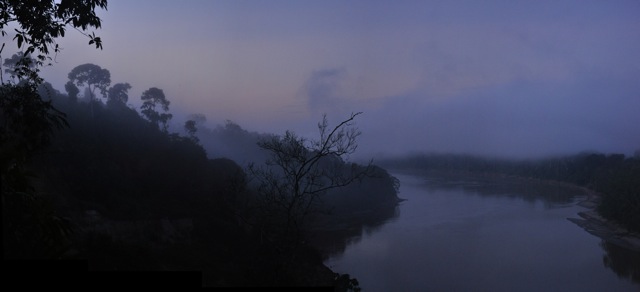
– Sarah Federman is a Masters of Forestry Science graduate student at the Yale School of Forestry & Environmental Studies. In her role as a conservation biologist, Sarah has explored increasingly isolated rivers systems in the Peruvian Amazon. This vignette describes one of her nights spent conducting biologic surveys near a far-flung satellite research station. –
The Peruvian Amazon never fails to impose quandaries. For instance, should one: a) spend the night on the conveniently positioned branch in the middle of the river; b) swim to the closer bank with what belongings you can carry and spend the night on the relative stability of a sand-fly infested beach; or c), attempt to right the sunken peque-peque (a little motorized, and apparently very tippy, canoe), and in the event of failure, contemplate again options a and b?
So there we stood, the only four out on the river at that hour, examining the situation as best we could by the light of our headlamps and the few stars visible through the thick night’s mist. Hernan and Edwin moved towards the bow of the peque, the only visible remainder of the boat; I crouched to see what they saw: a sharp and sturdy looking branch pressed deep into the hull, pushing the bow straight out of the water.
While Hernan, Edwin, and Adrian valiantly removed their boots (a good way to drown in the fast running currents of a river is to go for a dip in your rain-boots) and plunged into the water, I was delegated the all-important-task of standing on the branch with our belongings (as one of the belongings?). Two held the boat in turns, while the other hacked away at the offending branch with the aim of freeing the peque.
“Can’t I help?”
Hernan, who earlier that day had told me with a smile, and many complicated hand-gestures: ‘Yo. A-ma-rrar. Bo-te’. (I. Tie. Boat.), smiled again (though this time a bit more forced).
‘Why don’t you just stand on the branch and hold the light? Or even better, make your way over to that little sand-bar.’
Earlier that day I’d smiled in response to his horror at the audacity of my female hands, handing him the bowline I’d just tied to secure the boat to a tree on the riverbank. I watched as he untied it to concoct an incomprehensibly twisting ball of lines secured at the end by a single half-hitch. I was slightly surprised (maybe a little disappointed) by the boat’s continued presence upon our return, four hours later, from the transect. This time, through the mist-muted light of the stars, I smiled again and removed my own boots in order to wade towards the sandbar. Better to leave a discussion of gender politics for a time when I might be heard above the white noise of disaster.
They hacked at the branch in turns with their machetes, each blow causing the boat to rock more strongly on its pedestal. It had happened so quickly, and to my memory, with hardly any hysterics or alarm.
We were the only boat on the river, the dull roar of the motor absorbed and muted by the invisible lines of vegetation on either side. Edwin sat at the bow, the beam of his flashlight deadened and yellow against the delicate, unrelenting mist dancing across the water’s surface. I couldn’t see the veritable wall of forest along the riverbank through the mist. A wall that we’d passed through earlier that day to do the yearly survey transect of this remote site. Nor could I see the logs and other debris caught in the dark waters current, our silent companions.
We didn’t see the branch, our branch, until it was upon us, and then we were upon it, the bow of the peque lifting while water rushed into the back.
‘Onto the branch, onto the branch,’ chanted Hernan. Then we were on the branch and the peque was all but underwater, and it was going to be a long night… I was drawn out of my reverie when, with a magnificently understated splash, the peque dropped off its pedestal and turned belly up in the river. Scrambling comically, the three men managed to right the boat and float it, filled to the brim, to my little island. We all stood then, thigh deep in the night’s oh-so-friendly Los Amigos River, bailing the water with our boots. Edwin and Hernan waded back to the branch and proceeded to dive for the lost motor, which surprisingly, they found, and even more surprisingly, managed to get back into the boat.
With hardly a word, the two began to fashion paddles out of one of the peque’s raised floorboards. I couldn’t help but receive the distinct impression that they, or at the very least one of them, had experienced this before. With the boat bailed out, the motor tied securely in place, and the two brand new paddles, we four piled back into the peque and continued the misty voyage downriver.